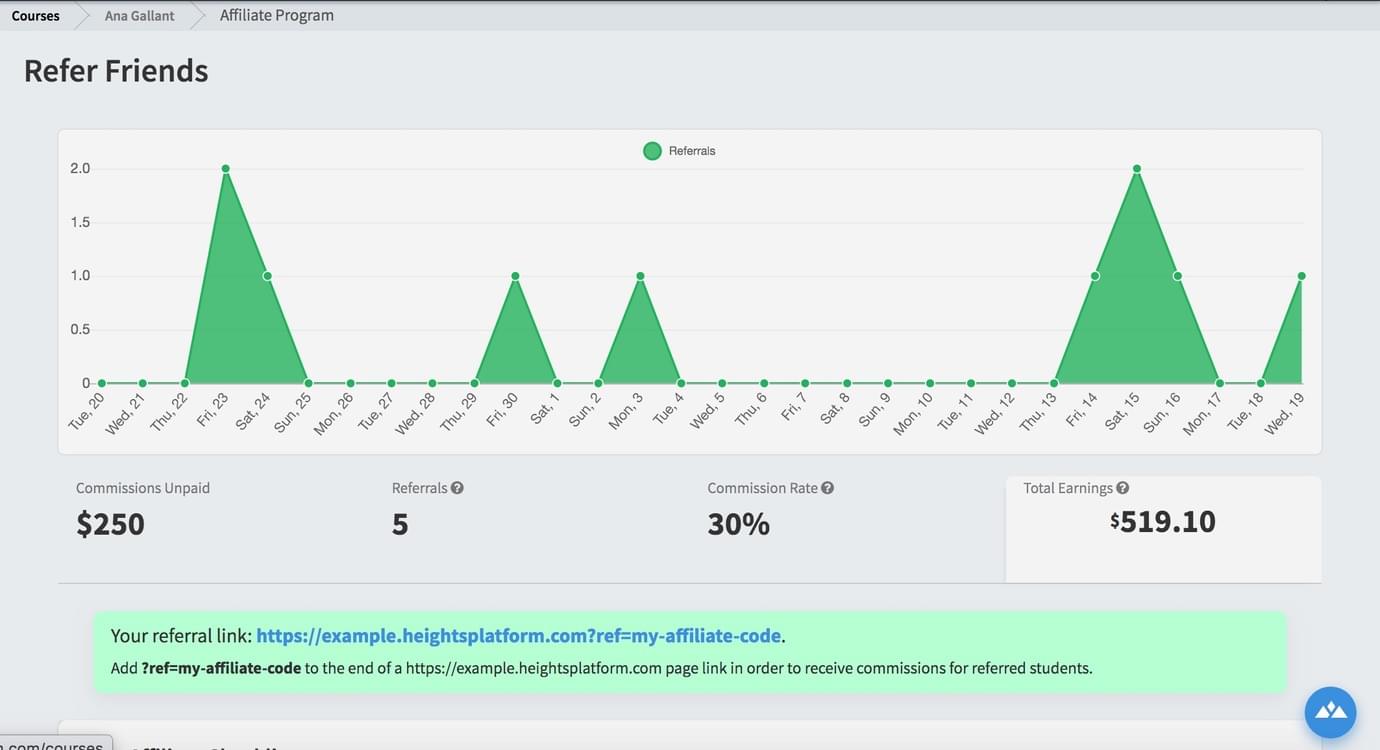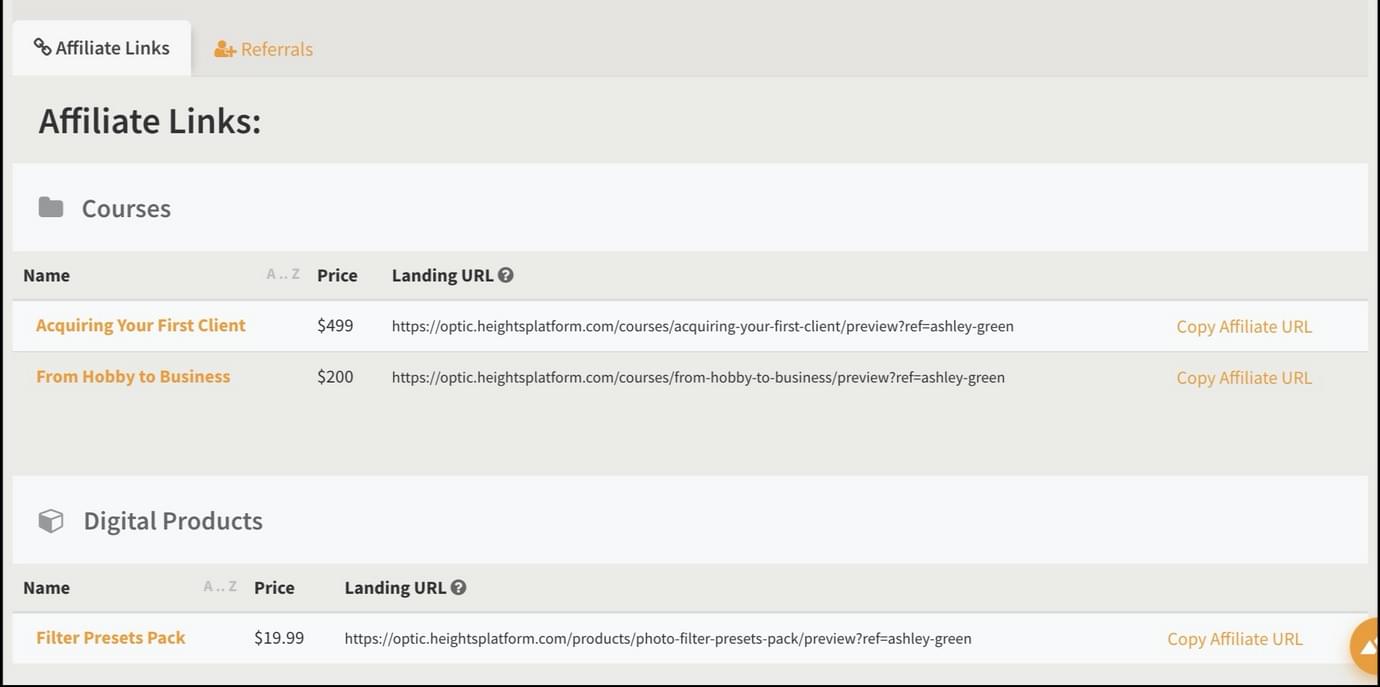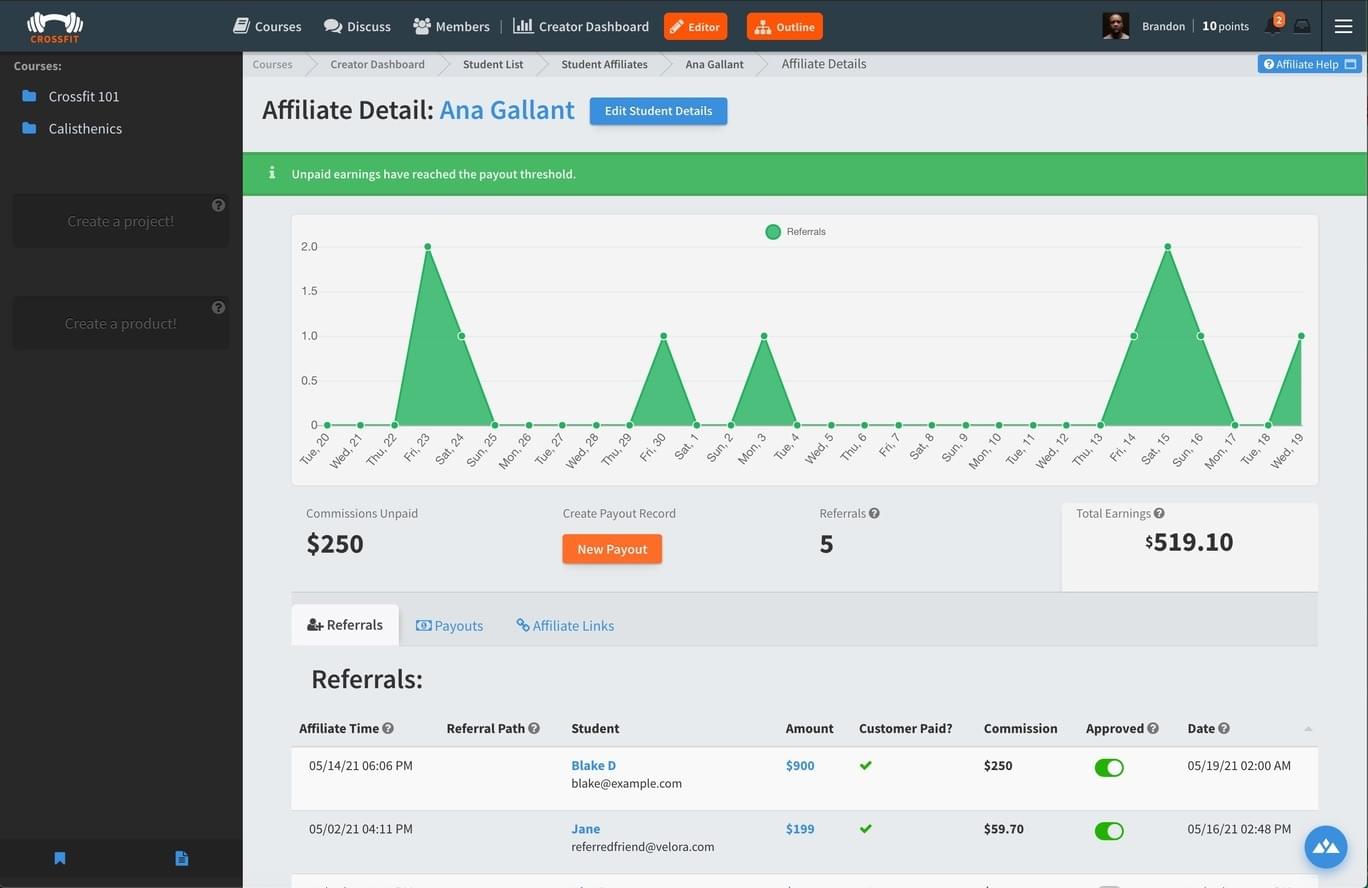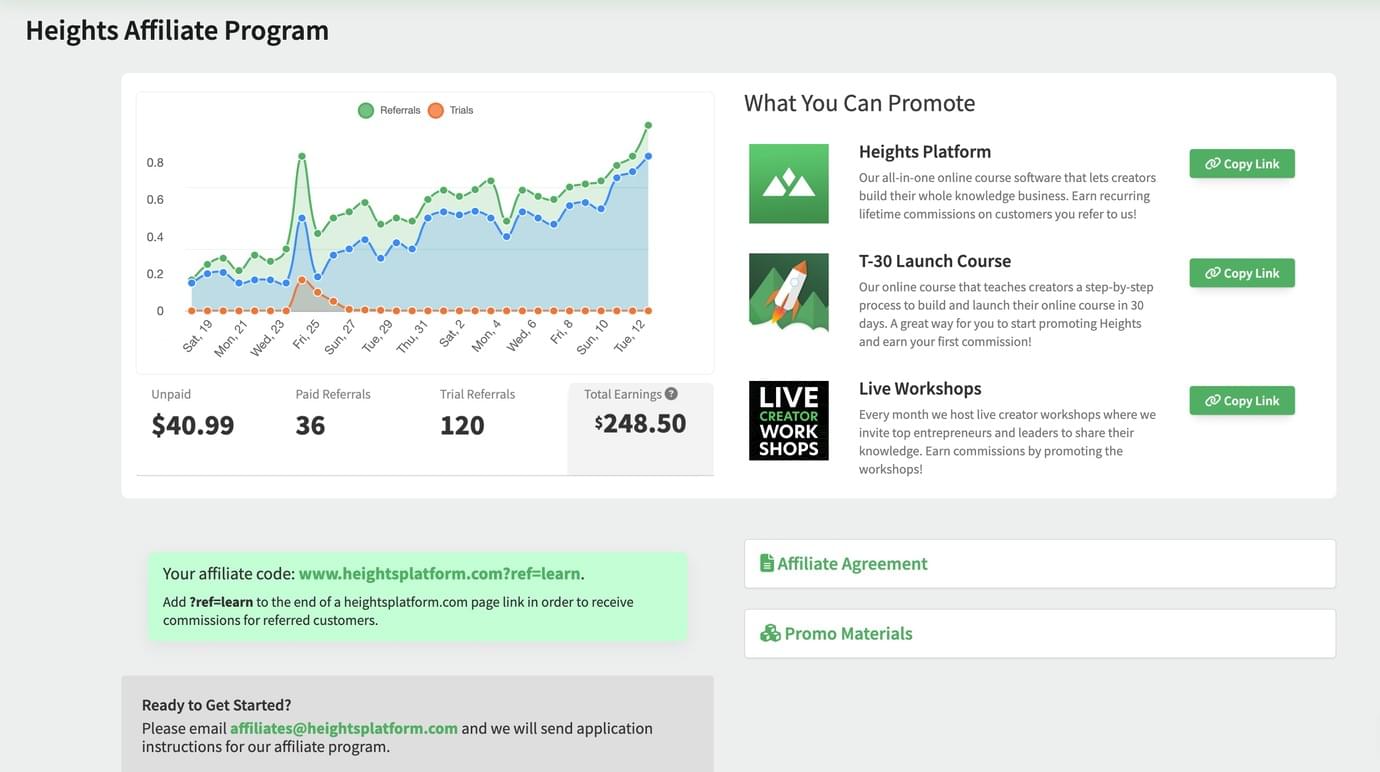How to Write an Affiliate Marketing Agreement for Your Online Course
8 minute readYou have just finished creating a new online course, and you are ready to launch. That's great! But now what?
How do you get students to purchase your course?
Now, it is time to promote your online course and get new sales. There are many marketing strategies you can implement to promote an online course.
Today, we will cover how you can promote an online course with affiliate marketing and, more specifically, how to create an affiliate marketing agreement.
How to Start an Affiliate Program to Promote Your Course
Before we get into everything you need to do to build your own affiliate agreement, it's important to note that this is the last step of building an affiliate program.
Affiliate marketing is a relatively straightforward marketing strategy. However, building your own affiliate program is not easy!
If you have an online course and you want to start using affiliate marketing to promote it, our suggestion is to use an online course platform with a built-in affiliate program instead of building your own.
You can do this by choosing an online course platform with a built-in affiliate program for creators to use.
Most software products have an affiliate program (where creators can promote the software and earn a commission), but this is not to be confused with your own affiliate program (where YOUR customers can promote your course).
Learn more about this:
- A Complete Guide on How to Launch an Affiliate Program to Promote Your Online Course
- How to Create Your Own Affiliate Program [5 Steps]

Heights Platform is an AI-powered online course creation software that has a built-in affiliate program for its creators. This means that as a course creator, you don't have to worry about building your own affiliate program or finding external software to help you out.
Everything is already built for you inside Heights Platform, and all you have to do is set a commission structure and add your affiliate agreement.
Create Your Online Course TodayWhat is Affiliate Marketing?
Affiliate marketing is a type of marketing strategy where your customers become advocates of your brand and actively assist you with promotion in exchange for a commission or other benefits.
As a business owner, you give your affiliates a special link they can use to promote your products or services online.
When someone else clicks on that link and purchases your product, the affiliate gets a commission on the sale.

Affiliate marketing is a great way to promote your course! This kind of marketing strategy is growing rapidly, with predictions stating it will be a $27.78 billion industry by 2027.
What's great about affiliate marketing is that it can boost sales and revenue without any upfront cost. Instead, you pay a commission only when a sale is made through an affiliate.
It also improves your website's visibility and search engine ranking, thanks to the number of affiliate links directing to your site.
Furthermore, affiliate marketing builds trust through social proof, as recommendations may come from reliable sources with significant followings. This method eliminates the need for you to actively promote your product, saving you effort and time.
The way affiliate programs works is quite simple. All you need is a course platform that sets it all up for you.

If you use Heights Platform to sell your courses and community, you can launch your own affiliate program with a click of a button.
Your students get a special link they can use to promote your courses and products, and you can easily track the number of sales that come from affiliates and manage your commission payouts. We will cover more about how to do this later in the article...
Create Your Online Course TodayWhat is an Affiliate Agreement?
An affiliate agreement is a legal contract between two parties, where one party (the affiliate) agrees to promote a product or service offered by another party (the brand) in exchange for a commission on sales or leads generated through the affiliate's marketing efforts.
These agreements are commonly used in online marketing and e-commerce environments, including the promotion of online courses.
Here are key components typically found in an affiliate agreement, especially for online courses:
1. Definition of Terms: Clarifies the meaning of important terms used within the agreement, such as affiliate, merchant, commission, leads, sales, etc.
2. Commission Structure: Details how the affiliate will be compensated. This might include commission rates, payment thresholds, and whether the commission is based on clicks, leads, or sales.
3. Payment Terms: Specifies how and when the affiliate will be paid. It includes information on payment methods, currency, payment frequency, and conditions that must be met before payment is made.
4. Duties and Responsibilities: Outlines what is expected from the affiliate, such as how the product or service should be promoted. It may also cover any restrictions on marketing methods (e.g., prohibiting the use of spam).
5. Intellectual Property: Addresses the use of the merchant’s trademarks, logos, and other intellectual property. It specifies how these can be used by the affiliate in promotional materials.
6. Term and Termination: Specifies the duration of the agreement and the conditions under which either party can terminate the agreement. It may also outline what happens with outstanding commissions after termination.
7. Confidentiality: Requires the affiliate to keep certain information confidential, protecting the merchant's business secrets and customer information.
8. Liability and Indemnification: Addresses the legal liability of both parties and usually includes clauses that protect the merchant from liability for actions taken by the affiliate.
9. Miscellaneous: Covers other legal considerations such as the governing law, dispute resolution mechanisms, and the implications of any breach of contract.
For an affiliate agreement specific to an online course, the agreement might also detail the use of course materials, restrictions on creating competing courses, and guidelines on how the course can be marketed to ensure the integrity and reputation of the course provider are maintained.
These agreements are crucial for managing expectations and responsibilities between the affiliate and the merchant, ensuring a mutually beneficial relationship.
What to Include in your Affiliate Agreement
If you're planning to start an affiliate marketing program for your online course, it's really important to have an affiliate agreement. Affiliate agreements help protect both you and the people promoting your course.
The details of your affiliate agreement might vary depending on what you need and how big your business is. So, let's see in detail what to include in your online course affiliate marketing agreement.
#1: Commision & Payout Information
Make sure your affiliate agreement has a section on payments to clear up all the details about how and when affiliates get paid, so there's no confusion later.
Here's what to include in this first section:
- Commission: Tell your affiliates exactly how much they'll make in percentage for each sale they bring in. Common affiliate commissions range from 10-40% of the sale.
- Threshold amount: This is the minimum amount an affiliate needs to make before getting paid. For example, if it's set at $50, an affiliate won't receive any money until they've earned at least that much.
- Payment timing: Instead of paying right after each sale, decide on a specific date or period for affiliate payments. You might choose to pay on the 1st of every month or within 30 days after a sale, but only if the affiliate has reached the threshold and the sale hasn't been refunded (for example).
- Payment method: Mention your preferred way to send payments. Many businesses use Paypal for its convenience and security.
- Preferred currency: State the currency you'll use for payments. It's usually the same one you use to sell your products or services.
#2: Attribution and Referral Tracking Information
This part is all about how you keep track of who's sending you referrals and make sure the right affiliates get credit. Depending on what kind of system you are using for your program, the way to track this might vary.
If you're using Heights Platform, for example, you get your own affiliate marketing program built right inside the platform.
This program uses cookies to keep an eye on each referral, and it can "remember" a sale that came from an affiliate link for up to 90 days. So, even if someone doesn't buy your course right when they click the affiliate link, but they do within the next 90 days (even from a different link), the affiliate still gets credit for the sale.
You might also want to explain how your program decides who gets credit for a sale. For example, with Heights Platform, we use what's called "last-click attribution." This means the last affiliate link the customer clicked before making a purchase is the one that earns the commission.
Most people agree that the "last-click" method is the fairest way to approach affiliate commission. It makes sure the affiliate who actually brought the customer gets the commission.
#3: Affiliate Promotion Rules & Guidelines
Let's see a key part of your affiliate agreement: the section that outlines how affiliates are allowed to spread the word about your business.
This section is essential because it sets the rules for promoting your online course, and depending on what your course offers and your personal preferences, the details might change. So, let's explore the dos and don'ts for your affiliates.
First up, you want to specify what your affiliates are encouraged to do. These can be actions such as:
- Affiliates should feel free to promote your product in any approved manner, whether that's on a blog, website, or social media, as long as it's relevant to your niche.
- Affiliates are encouraged to use your logo and any other materials you've approved for promotion.
- Affiliates should be honest and upfront with their audience, making it clear they're promoting a product they are affiliated with.
Here, you can also add some things that your affiliates cannot do. For example, these could include:
- Promoting your online course through illegal means or spam? Big no-no.
- Running paid ads that compete with yours. This could lead to a scenario where they're essentially snatching clicks from potential customers you've already engaged with or, worse, driving up your advertising costs.
- They shouldn't distribute, copy, reverse-engineer, resell, or reproduce the product you are selling in any way.
- If you have trademarks on your course, your affiliates should steer clear from using them in their promotions unless you've given them the green light for specific uses.
- Offering cash or other incentives that were not approved by you to get a higher response rate from their promotion. However, trading non-monetary perks, like offering a free mini-course for purchasing through their link, is generally acceptable and encouraged if you are aware of it.
By setting these guidelines, you're ensuring that your affiliates will help grow your business in a way that aligns with your values and marketing strategies.
#4: Independent Contractor Clause
Based on the regulations in your jurisdiction, it may be a good idea to clarify in your affiliate program agreement that your organization engages affiliates not as employees but strictly as independent contractors.
This clarification can help mitigate legal risks associated with your program. Additionally, it places the responsibility of tax payment on the earnings of affiliates onto themselves. For example many businesses with affiliate programs in the US may want to collect W-9 forms from their affiliates for tax purposes.
While we cannot offer specific legal guidance for your business here, it is generally advisable to transparently define the nature of the relationship between your company and any affiliate marketer who intends to dedicate substantial resources towards promoting your business.
#5: Terms and Termination
This section of the clause is designed to provide guidance to your affiliates on the process of terminating the entire agreement.
It is important to outline the specific procedures you prefer for managing your relationship with affiliates, and these should be clearly defined within this segment of the agreement.
Launch Your Online Course Affiliate Program With Heights Platform
Starting your own affiliate program is easy, but not if you're building and developing it from scratch, which can be quite a challenge!
However, if you're using Heights Platform, the hard work is already taken care of for you.
Heights Platform lets you launch your affiliate program with one click, and it's completely free if you're already signed up with Heights!

Not only your students but also other affiliates can easily become promoters of your online course.
Our built-in affiliate program gives you instant access to essential information such as referral data, affiliate lists, pending commissions, and much more!
You have the flexibility to set your commission rates, choose between one-time or recurring commissions, establish a minimum payout amount, and more.
Joining Heights allows you to not only create engaging online courses but also to have your own affiliate program at no extra cost.
Create Your Online Course TodayP.S.: Heights Platform also has an affiliate program for creators, where you can earn high commissions by recommending Heights Platform to other creators! Join the Heights Platform's affiliate program here.




